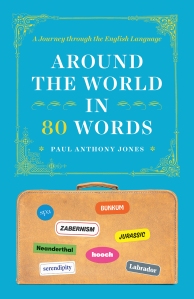By Amanda Clarke
For lovers of words, books are a great way to travel at any time. When actual travel is not possible, books that can take you to far-off places become even more important. Around the World in 80 Words: A Journey Through the English Language takes us on a worldwide journey through geographic etymology, exploring words in the English language that are derived from place names. It covers every continent (minus Antarctica) starting in Europe and travelling through Africa, up through the Middle East, Asia, and Oceania, before jumping across the Pacific Ocean to North and South Americas, and returning across the Atlantic to finish off in the UK. It’s an interesting route, covering many far-flung and tiny towns, and while a map or some visuals would be a nice addition, it’s still an enjoyable read. But, like any round-the-world trip, this one has its bumps, too.
Author Paul Anthony Jones has an affinity for archaic and obscure terms, starting the trip in London, England, with Kent Street ejectment, a term that has seen little use since the nineteenth century. This affinity makes for some interesting stories—the visit to Ytterby, Sweden, for yttrium is well worth the trip—however, the trip to Toronto for Toronto blessing is a stretch. (I’ve lived in Toronto my whole life and had never heard this term before.) It also feels like the concept of “around the world in 80 words” isn’t quite able to sustain a whole book, which would be more accurately titled Around the World in 500 Words, since most chapters sneak in at least an extra half dozen in addition to the major term being discussed.
However, the tone is light and conversational, just the thing for a vacation, and it is in the obscure terms that Jones has found some of the best source material. Where else could you read excerpts from The Mariner’s Mirrour (1588), A Classical Dictionary of the Vulgar Tongue (1785), or The Dictionary of Jargon, Slang and Cant (1889)?
This is a book that is made for perusing—a quick diversion throughout the day. It’s fun to jump between continents, stopping in Qumis, Iran, for the story of the parting shot, followed by a quick hop to Bikini Atoll in the Marshall Islands to learn about the origins of the bikini. There are also plenty of common everyday words with great stories behind them: spa from Spa, Belgium; satsuma from Kagoshima, Japan; and dollar, derived from Jáchymov in the Czech Republic, are all standouts.
There is a small issue with some false advertising of chapters. Each chapter (except “Canary Islands” and “Gibraltar”) is headed by a city, country, and word. The problem is that often the city has nothing to do with the word, or the bulk of the chapter is concerned with a different word. Why specify Copenhagen if Denmark is the etymology of Great Dane? Why stop in Kabul if Afghanistanism is the word of interest? Admittedly, this is a small quibble, but it creates a disconnect every time the mismatch occurs.
Another frustration are the chapters where the head term is relegated to the last paragraph while the bulk of the chapter is devoted to discussing another word (or words). In the chapter on Lima syndrome, the author spends almost three pages discussing Stockholm syndrome and only half a page on Lima syndrome. At least it can be argued that the term Lima syndrome has its roots in Stockholm syndrome. Not so with the chapter on ampster, which spends a full 80 percent of its space discussing terms derived from the word Dutch before even mentioning Amsterdam. The actual word ampster only gets a measly quarter page.
But by far the biggest issue with Around the World in 80 Words comes near the end, when we find ourselves in Newfoundland and Labrador. In his discussion of the etymology of Labrador (the dog breed), Jones incorrectly states that Newfoundland is one of Canada’s 13 provinces and that it joined Canada in 1933 (not 1949). While this is not a book of academic rigour and it is upfront that some of the etymology it covers is speculation or legend, two such blatant (and easily verified) factual errors are hard to overlook. (I’ll admit the fact that these are errors about Canada is particularly irksome.) That two such basic pieces of information could be incorrect calls into question the overall research put into the book. It didn’t completely spoil the story of dirty limericks that follows, but it did drive me to Google on several occasions to double-check facts.
But all is not lost. In many ways, it doesn’t matter if Around the World in 80 Words is factual or not. This is a tale of words and there are many great stories here. The story behind Jurassic from the Jura Mountains is wonderful, slightly dreamy, and inspiring. Then there is the curious story of turkey (the food) that finds its etymology in Turkey (the country) despite the bird having no connection whatsoever to Turkey (it is native to North America). And the story of vaudeville from Vire, France, which is as entertaining as the performances it names.
The book is fun, short, and breezy—unlike an actual trip round the world. If you’re looking for something with academic rigour, this is probably not the trip for you. But Around the World in 80 Words is an enjoyable jaunt through the continents, even if some of it is folklore.
Amanda Clarke is a freelance fiction editor based in Toronto.
This article was copy edited by Paul Neuviale.

